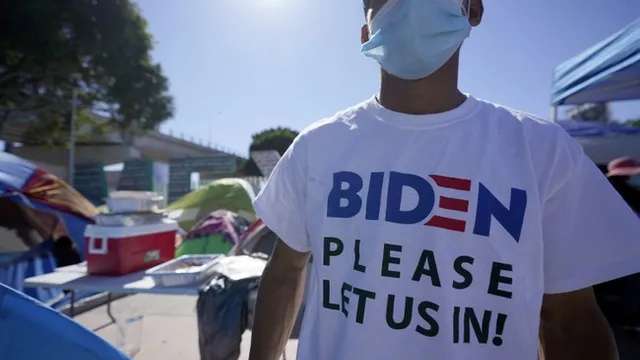
Mexico prepares to shelter thousands of deported nationals under Trump's plan
2025-01-01 16:53- The Mexican government is sending hundreds of lawyers to the U.S. to assist illegal immigrants.
- Authorities have developed a panic button app for citizens facing deportation.
- These actions are part of Mexico's strategy to prepare for expected mass deportations.
Express your sentiment!
Insights
In late December 2024, reports emerged indicating that the Mexican government plans to send hundreds of lawyers to the United States to assist illegal immigrants currently residing there. This initiative appears to be a response to growing concerns about mass deportations anticipated under the incoming Trump administration. As President Trump has made it clear that he intends to enforce stricter immigration policies, Mexico has been actively preparing for the potential influx of repatriated citizens. There are anticipated challenges in managing the legal status of millions of Mexican migrants, including those who have crossed the border illegally. In anticipation of the actions by the new administration, Mexico is also developing a mobile application designed to help its citizens who find themselves facing deportation. This application serves as a panic button, which allows users to alert the nearest Mexican consulate and their families if they are detained. The Mexican government believes this resource will provide essential support and guidance to those in precarious situations. In conjunction with digital resources, Mexico is increasing its consular staff and legal aid to navigate the complex deportation process, demonstrating a committed effort to support its citizens abroad. Furthermore, the Mexican government has announced the opening of 25 new shelters within Mexico to accommodate citizens who are returned following deportation. These shelters are specifically for Mexican nationals and are intended to provide temporary housing as deportees transition back to their hometowns. Baja California Governor Marina del Pilar Ávila Olmeda has emphasized that these shelters will not assist foreign nationals and are part of a strategic plan to respond to the expected mass deportations once Trump is inaugurated. Each shelter will hold around 500 individuals, ensuring that the returnees receive proper care and accommodation. Overall, these actions signify a response to the anticipated changes in U.S. immigration policy. Mexico's proactive measures are centered on providing legal assistance, establishing emergency communication tools, and ensuring safe repatriation processes for its nationals. As Trump has made immigration reform a core aspect of his political platform, the Mexican government is preparing for the implications of such policies on its citizens living in the U.S. The cooperation between the two nations regarding these policies continues to evolve amid ongoing discussions on immigration, legal status, and humanitarian outcomes.
Contexts
In a small town in Ohio, Maribel Trujillo, a devoted mother of four U.S. citizens, found herself at the center of a heartbreaking struggle after being arrested in her home. Since 2002, she had worked hard to provide for her family, contributing to her community and living a life that many would call the American dream. Her unexpected detention shattered this fragile existence, as she faced the looming threat of deportation back to Mexico. As news of her situation spread, consular staff from Indianapolis and New Orleans quickly rallied to support Maribel and her legal team. The Mexican Foreign Ministry remained engaged, committed to assisting her family in the United States during this tumultuous time. Their support underscored a broader initiative by Mexico to protect its citizens who found themselves vulnerable under new U.S. immigration policies. With rising tensions between the U.S. and Mexico over immigration enforcement, the Mexican government announced the establishment of migrant defence centres. These centres aimed to provide free legal assistance to Mexicans facing deportation, an urgent response to President Trump's controversial directives to intensify deportation efforts. Amidst uncertainty, Mexico's Foreign Minister Luis Videgaray expressed deep concern over the human rights of Mexicans, emphasizing the necessity of legal aid without advocating for illegality. As thousands of Mexican citizens like Maribel grappled with the fear of deportation, they faced a daunting future filled with legal battles and separation from their families. The dialogue between Mexico and the U.S. became ever more critical, with every action echoing the complexities of human rights and immigration policy in a time of crisis.